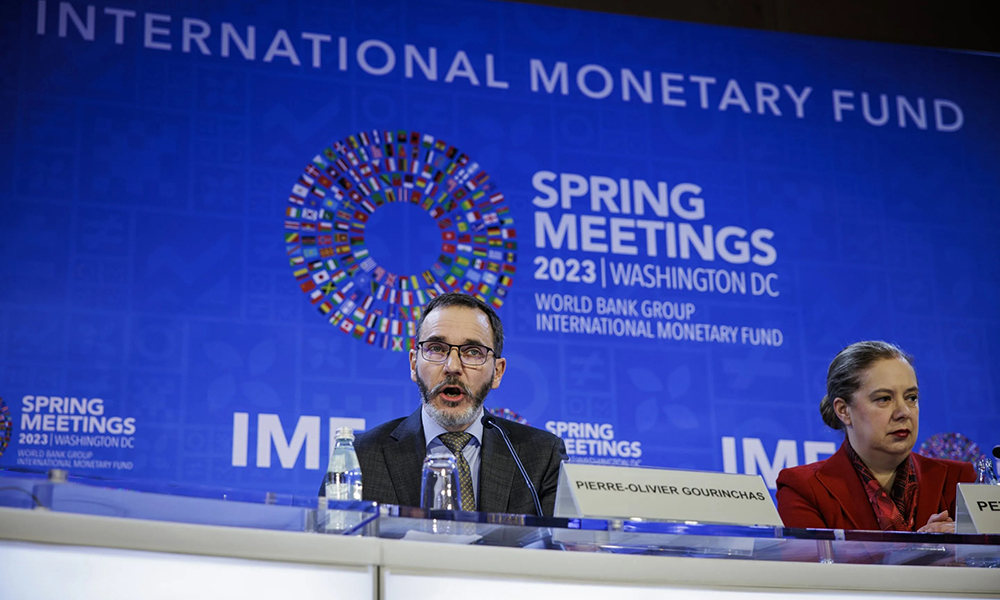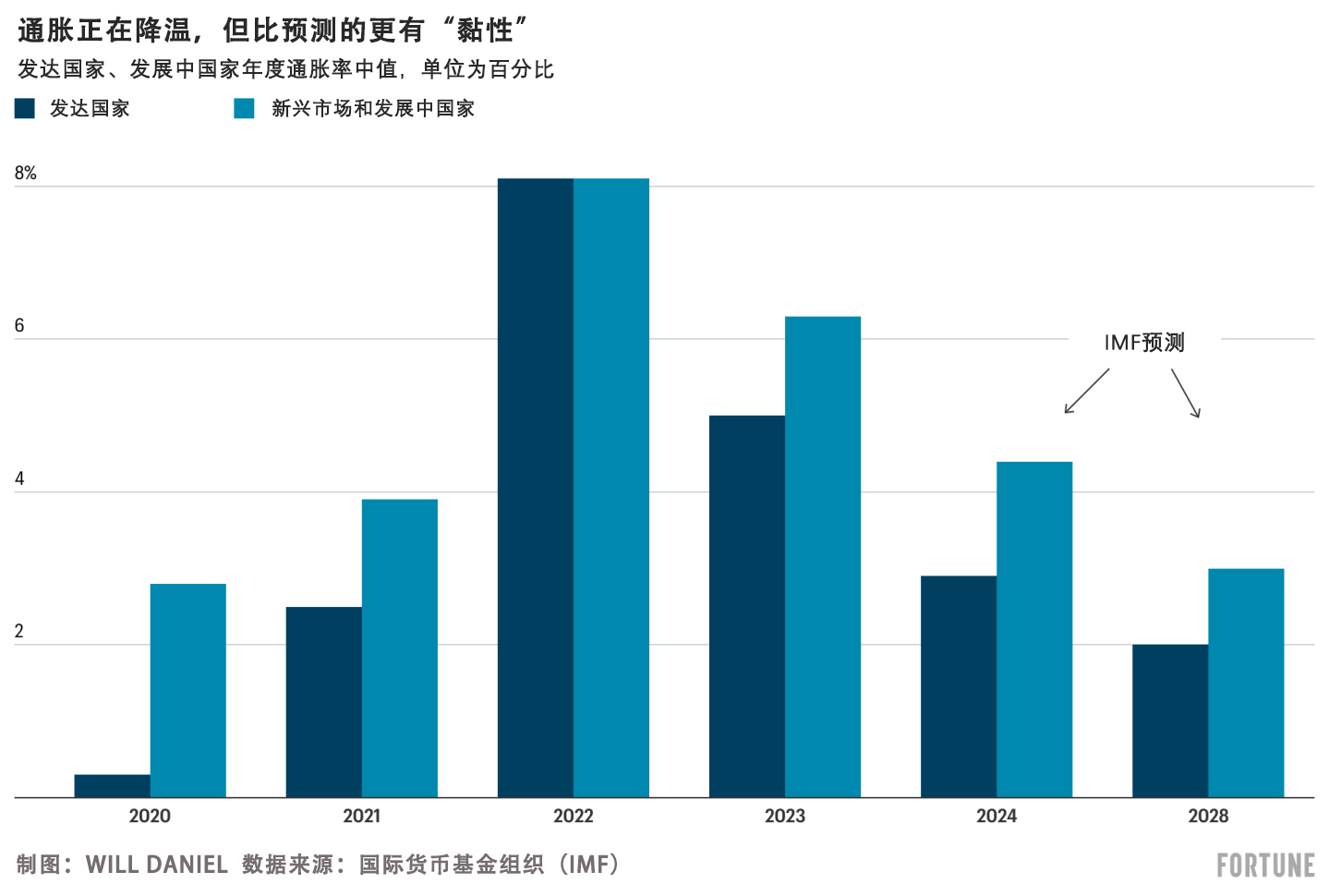
4月11日,国际货币基金组织(IMF)发布了其4月份的《世界经济展望报告》,而且其研究人员直言不讳地警告称,顽固的通胀可能会在更长的时间内不断推高利率,继而导致全球经济“硬着陆”。该报告与高盛(Goldman Sachs)最近的预测以及巴克莱银行(Barclays)2月的预测形成了鲜明对比。高盛称,劳动力市场的重新平衡将让美国“软着陆”,同时通胀将在美国得到控制,且不会引发衰退。巴克莱银行则表示,美国“不着陆”,而是呈现经济韧性增长,通胀继续走高的气象。从某些方面来看,IMF的新展望忽视了有关通胀的一个非常有建设性的趋势。
全球很多央行最近几个月在应对物价上涨的战役中取得了一些成果。在美国,通胀同比从6月峰值9.1%回落至2月的仅6%。欧盟的主要通胀指标从2月的8.5%降至上月的6.9%。然而,IMF的经济学家依然认为,通胀问题会持续数年的时间。他们预测,发达国家的物价增速要到2024年之后才会回落至央行2%的目标,而且这一局面对于发展中国家来说甚至更加糟糕。

IMF称,全球经济增速将从2022年的3.4%降至2023年的2.8%,并在2024年趋稳,达到3%。IMF总裁克里斯塔利娜·格奥尔基耶娃近期表示,预测中的这些数字是30年以来最惨淡的中期全球增长预测。
4月11日,IMF首席经济师皮埃尔-奥利维尔·古林查斯还警告称,经济在银行危机之后所表现出来的实力和韧性,包括美国创历史新低的失业率以及稳健的经济增长,并不能说明全部情况。
古林查斯写道:“在表象之下……动荡正在酝酿,而且近期银行不稳定性问题的爆发也在提醒我们,整个局面非常脆弱。”他还表示,衰退的概率已经“大幅增加”。
不断增长的风险
古林查斯与IMF列出了可能导致全球经济硬着陆的多个风险。首先,他们警告称,在经历了近期的银行危机之后,金融领域的压力有可能会放大。他们认为这种现象将继续“扩散”,继而放缓经济领域的借贷和投资进程。
IMF货币与资本市场部主任托比亚斯·阿德里安在4月11日的新闻发布会上称:“我们所有人都亲眼目睹了银行界最近发生的事情,这些事件凸显了货币政策和金融环境趋紧之际业界所面临的诸多挑战。”他还指出,“金融领域正变得越来越脆弱。”
阿德里安的声明与上个月美国财政部长珍妮特·耶伦的讲话内容背道而驰,因为后者认为“美国银行系统状况良好”,而且危机后局势“正逐渐稳定”。本周,耶伦依然对此次危机的后遗症闭口不提,她4月11日在华盛顿对记者说,经济状况甚至比6个月之前还要好。
尽管耶伦做出了上述展望,但IMF经济学家认为,银行危机引发新一轮金融动荡的概率为15%,而且如果此类动荡真的发生,那么必将引发全球性的衰退。
阿德里安还警告称,金融市场不断增长的压力可能会让央行的降通战役变得更加“复杂”。古林查斯称,这是一件麻烦事,因为通胀“比几个月前预期的更具黏性”。
他写道:“尽管全球通胀有所下降,但这一现象主要源于能源和食品价格的急剧下滑。”他指出,核心通胀并不包括高波动性的能源和食品价格,它“在很多国家并未见顶”,而且依然“远高于目标值”。
IMF还指出,“地缘政治区块的分化”带来的外国直接投资下滑或将放缓全球经济增长,并给出了具体原因。古林查斯认为,“在借贷成本高企以及经济增速放缓的背景下,零星出现的主权债务危机可能会扩散并发展成为系统性问题。”
他写道:“在改善前景,降低风险方面,决策者可以使用的手段十分有限。各大央行有必要继续坚定地高举其降通旗帜,同时要根据事态发展的需要,做好调整和使用其全套政策工具的准备,包括解决金融稳定性问题。”(财富中文网)
译者:冯丰
审校:夏林
4月11日,国际货币基金组织(IMF)发布了其4月份的《世界经济展望报告》,而且其研究人员直言不讳地警告称,顽固的通胀可能会在更长的时间内不断推高利率,继而导致全球经济“硬着陆”。该报告与高盛(Goldman Sachs)最近的预测以及巴克莱银行(Barclays)2月的预测形成了鲜明对比。高盛称,劳动力市场的重新平衡将让美国“软着陆”,同时通胀将在美国得到控制,且不会引发衰退。巴克莱银行则表示,美国“不着陆”,而是呈现经济韧性增长,通胀继续走高的气象。从某些方面来看,IMF的新展望忽视了有关通胀的一个非常有建设性的趋势。
全球很多央行最近几个月在应对物价上涨的战役中取得了一些成果。在美国,通胀同比从6月峰值9.1%回落至2月的仅6%。欧盟的主要通胀指标从2月的8.5%降至上月的6.9%。然而,IMF的经济学家依然认为,通胀问题会持续数年的时间。他们预测,发达国家的物价增速要到2024年之后才会回落至央行2%的目标,而且这一局面对于发展中国家来说甚至更加糟糕。
IMF称,全球经济增速将从2022年的3.4%降至2023年的2.8%,并在2024年趋稳,达到3%。IMF总裁克里斯塔利娜·格奥尔基耶娃近期表示,预测中的这些数字是30年以来最惨淡的中期全球增长预测。
4月11日,IMF首席经济师皮埃尔-奥利维尔·古林查斯还警告称,经济在银行危机之后所表现出来的实力和韧性,包括美国创历史新低的失业率以及稳健的经济增长,并不能说明全部情况。
古林查斯写道:“在表象之下……动荡正在酝酿,而且近期银行不稳定性问题的爆发也在提醒我们,整个局面非常脆弱。”他还表示,衰退的概率已经“大幅增加”。
不断增长的风险
古林查斯与IMF列出了可能导致全球经济硬着陆的多个风险。首先,他们警告称,在经历了近期的银行危机之后,金融领域的压力有可能会放大。他们认为这种现象将继续“扩散”,继而放缓经济领域的借贷和投资进程。
IMF货币与资本市场部主任托比亚斯·阿德里安在4月11日的新闻发布会上称:“我们所有人都亲眼目睹了银行界最近发生的事情,这些事件凸显了货币政策和金融环境趋紧之际业界所面临的诸多挑战。”他还指出,“金融领域正变得越来越脆弱。”
阿德里安的声明与上个月美国财政部长珍妮特·耶伦的讲话内容背道而驰,因为后者认为“美国银行系统状况良好”,而且危机后局势“正逐渐稳定”。本周,耶伦依然对此次危机的后遗症闭口不提,她4月11日在华盛顿对记者说,经济状况甚至比6个月之前还要好。
尽管耶伦做出了上述展望,但IMF经济学家认为,银行危机引发新一轮金融动荡的概率为15%,而且如果此类动荡真的发生,那么必将引发全球性的衰退。
阿德里安还警告称,金融市场不断增长的压力可能会让央行的降通战役变得更加“复杂”。古林查斯称,这是一件麻烦事,因为通胀“比几个月前预期的更具黏性”。
他写道:“尽管全球通胀有所下降,但这一现象主要源于能源和食品价格的急剧下滑。”他指出,核心通胀并不包括高波动性的能源和食品价格,它“在很多国家并未见顶”,而且依然“远高于目标值”。
IMF还指出,“地缘政治区块的分化”带来的外国直接投资下滑或将放缓全球经济增长,并给出了具体原因。古林查斯认为,“在借贷成本高企以及经济增速放缓的背景下,零星出现的主权债务危机可能会扩散并发展成为系统性问题。”
他写道:“在改善前景,降低风险方面,决策者可以使用的手段十分有限。各大央行有必要继续坚定地高举其降通旗帜,同时要根据事态发展的需要,做好调整和使用其全套政策工具的准备,包括解决金融稳定性问题。”(财富中文网)
译者:冯丰
审校:夏林
The International Monetary Fund (IMF) released its April World Economic Outlook on Tuesday, and its researchers didn’t hold back, warning that stubborn inflation could keep interest rates higher for longer, leading to a “hard landing” for the global economy. Their report contrasts with Goldman Sachs’ recent forecast that labor market rebalancing will enable a “soft landing” in the U.S.—where inflation is tamed without sparking a recession—as well as Barclays’ February projection for a “no-landing” scenario that involves resilient economic growth and higher inflation. And in some ways, the IMF’s new outlook disregards a genuinely constructive trend on inflation.
Many central banks worldwide have made progress in their fight against rising consumer prices in recent months. In the U.S., year-over-year inflation dropped from its 9.1% June peak to just 6% in February. And the European Union saw its key inflation measure sink to 6.9% last month, from 8.5% in February. But the IMF’s economists still believe inflation will be an issue for years to come. In developed economies, they forecast, it will take until after 2024 for consumer price increases to fall to central banks’ 2% target—and the situation will be even worse for developing nations.
Global economic growth will also fall from 3.4% in 2022 to 2.8% in 2023, according to the IMF, before leveling off at 3% in 2024. The fund’s director, Kristalina Georgieva, noted last week that the forecast amounts to the weakest medium-term global growth projection in over 30 years.
On Tuesday, the IMF’s chief economist Pierre-Olivier Gourinchas also warned that recent signs of economic strength and resilience in the wake of the banking crisis, including the historically low unemployment rate and steady economic growth in the U.S., aren’t telling the whole story.
“Below the surface…turbulence is building, and the situation is quite fragile as the recent bout of banking instability reminded us,” Gourinchas wrote, adding that the odds of a recession have “risen sharply.”
Rising risks
Gourinchas and the IMF outlined several risks to the global economy that could cause a hard landing. First, they warned of the potential for financial sector stress to amplify after the recent banking crisis, arguing that “contagion” could take hold, slowing lending and investment in the economy.
“We have all witnessed the recent events in the banking sector. These are powerful reminders of the challenges now being faced as we see tighter monetary policy and tighter financial conditions,” Tobias Adrian, director of the monetary and capital markets department at the IMF, said in a press release Tuesday, noting that “financial sector vulnerabilities are building up.”
Adrian’s statement contrasts with Treasury Secretary Janet Yellen’s comments last month, when she argued that the “U.S. banking system is sound” and the post-crisis situation “is stabilizing.” Yellen brushed aside the after effects of the crisis again this week, telling reporters in Washington, D.C., Tuesday that the economy is even better off than it was six months ago.
Despite Yellen’s outlook, the IMF’s economists argued that there is a 15% chance of another financial shock coming from the banking crisis, and that if that were to occur, a global recession would be unavoidable.
Adrian also warned that rising stress in financial markets could make central banks’ fight against inflation even more “complicated.” That’s a problem because, according to Gourinchas, inflation is “much stickier than anticipated even a few months ago.”
“While global inflation has declined, that reflects mostly the sharp reversal in energy and food prices,” he wrote, noting that core inflation, which excludes more volatile energy and food prices, “has not yet peaked in many countries” and remains “well above target.”
The IMF also detailed how “fragmentation into geopolitical blocs” could slow economic growth globally by reducing foreign direct investment. And Gourinchas argued that “pockets of sovereign debt distress could, in the context of higher borrowing costs and lower growth, spread and become more systemic.”
“Policymakers have a narrow path to walk to improve prospects and minimize risks,” he wrote. “Central banks need to remain steady with their tighter anti-inflation stance, but also be ready to adjust and use their full set of policy instruments—including to address financial stability concerns—as developments demand.”






